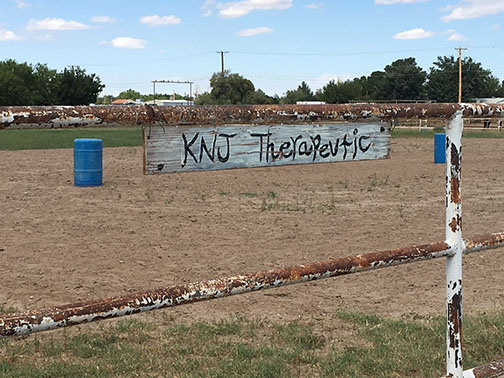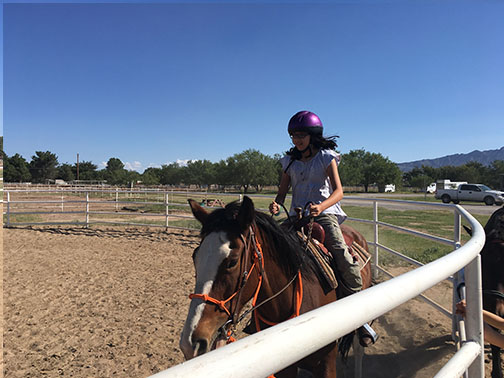In the sleepy little farm town of Canutillo, Texas – just across the river from El Paso, is the 20-acre Rio Grande Valley Ranch that boards horses, steers, ponies and even goats .
The ranch is also home to a some horses that are specially trained to help people with special needs.
The horses are used to connect with people who have disabilities such as social disorders, confidence issues, PTSD, fetal alchohol syndrome, Downs syndrome, autism and even young abuse victims.
Noel Cass and her friend Rita Nicolini operate KNJ Therapeutic, which helps about five people a day break through the wall built by their disabilities.

Cass was trained in Phoenix and is PATH certified, which stands for Professional Association of Therapeutic Horsemanship. She has been in the field for 10 years. Nicolini is a Yoga Alliance registered teacher and her specialty is “Whoaga” a mix of horseback riding and yoga. She has been doing this for 6 years.
“I felt a natural combination of the two. The benefit of being outdoors in the sunshine connected to an accepting, loving spiritual creature while you’re practicing self-care in the form of yoga is exponentially greater then just doing yoga on a mat,” Nicolini said.
Whoaga is done with a saddle and without. Not being on the saddle is preferred because of the greater movement around the horse and closer connection to the horse. But there are some postures that can only be done in the saddle that help build muscles while the rider’s feet are in the stirrups.
“By using the horse, we can really open up through the hips and shoulders to release all that pain. Not only do we find more space in our bodies but typically when we create more space around our hearts we create more emotional space in our hearts,” Nicolini said.
For Cass, it’s not just a job.
“Its therapeutic to me to have these individuals come out and thrive and see their confidence get boosted. Its helping them which helps me. I like helping people and seeing them happy” Cass said.
One of their younger riders was an abuse victim and has trouble communicating with her parents and friends after withdrawing.
After several sessions working with the horses, the girl opened up to Cass and was able to talk about her traumatic experience.
Cass finds the horses and then trains them herself. However, not all horses are compatible with the program. In the rare case that happens, she either will trade them for another horse or find the horse a new home.
One of the benefits of horse therapy is building confidence and trust.
 Genese Munoz, a 10-year-old in 5th grade at St. Mark’s, has been taking lessons for three years with KNJ.
Genese Munoz, a 10-year-old in 5th grade at St. Mark’s, has been taking lessons for three years with KNJ.
“I learned how to control the horse and not freak out, just keep taking deep breaths,” Genese said.
Toni Munoz, Genese’s mother, recognized that her daughter needed a little confidence.
“There have been some incidences where she had to push through some of her insecurities on the horse. Noel is really good with not letting them give up, face their fears and work through them. For Genese, that’s great,” Munoz said.
“I think its made her a more compassionate person especially around animals,” Munoz said.
KNJ even incorporates goats into the therapy.
“Goats are good starters especially for autistic children who really respond to the texture of the animal,” Nicolini said.
For Nicolini and Cass, horse therapy seems to be a gift they use to help other people in need. Their satisfaction goes well beyond any financial gains.
“(Horses) remind me to take a deep breath,” Nicolini said. “They soften me in the way the world makes me rigid, tense, scared or stressed. They are forgiving and patient. They provide a safe place to truly feel and be who you are.”
The work brings Cass a sense of purpose.
“There have been times in the past I felt like doing something else but I think this is where God put me for a reason,” she said. “I couldn’t see myself doing anything else, I really couldn’t.”

